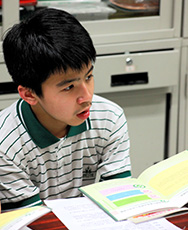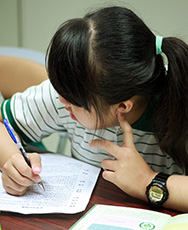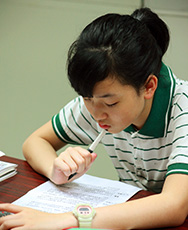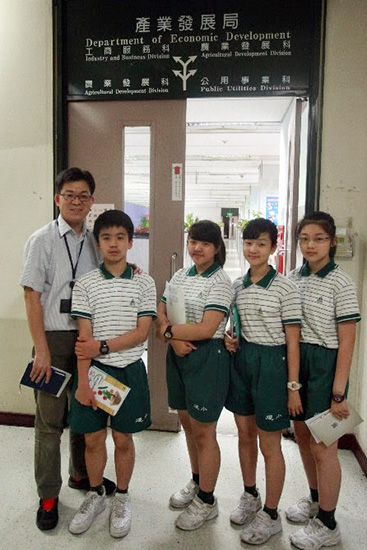| |
| |
|
|
|
|
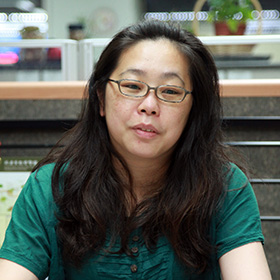 |
|
| |
Chu-jung Wang
Education
- Graduate Institute of Horticulture, National Chung Hsing University
Experiences
- Assistant Technical Specialist, Department of Economic Development, Taipei City Government
- Deputy Director, Horticultural Service Center, Taipei Flora Expo
- Subsection Chief, Department of Economic Development, Taipei City Government
Currently
- Subsection Chief, Department of Economic Development, Taipei City Government
|
|
| |
|
|
| |
|
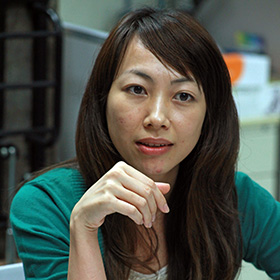 |
|
| |
|
Mei-hsiu Kuo
Education
Currently
- Assistant Technical Specialist, Department of Economic Development, Taipei City Government
|
|
| |
| Food Industry Experts |
(Tsai-chen) |
2) Department of Economic Development,
Taipei City Government
Time: May 15, 2014
Location: Department of Economic Development, Taipei City Government
Introduction
The services of Department of Economic Development, Taipei City Government include the management of recreational farms, organic farms, and Taipei Market. All these organizations are closely associated with our research topic, so we decided to interview Ms. Chu-rong Wang (Section Chief of Department of Economic Development, Taipei City Government) and Ms. Mei-hsiu Kuo (Assistant Technical Specialist). In this interview, we learnt that the government had done many things for the citizens, including promotion of food safety and food certification labels, seminars on marketing and farming technology for farmers, and agricultural product inspection. We have learnt a great deal from this interview.
Q1. According to the definition of “organic agricultural products”, is it difficult to grow “totally organic fruits” in Taiwan? (Yin-cheng)
A1. There will be certain levels of difficulties, because the fruit trees have their growth periods. Actually it takes 5-6 years from blossoming, fruit yield to harvest and is impacted by the quality of water and soil a lot. The certification process of organic agricultural products requires a lot of time and money. Especially, when the farmers decide to grow organic fruits, they should have certain knowledge to meet the standards, which is very difficult. In Japan, a farmer named Kimura cultivated organic apples, and succeeded on the ninth year. In Taiwan, organic fruits do not account for a high proportion, due to planting vegetables is much easier than planting fruits, so planting organic fruits becomes even more difficult in Taiwan.
Q2. How many organic vegetable and fruit demonstration shops are there in Taipei City? Are all products in the shop organic? (Tsai-chen)
A2. There is only one model shop of organic vegetable and fruit in Taipei, near Taipei EXPO Park, which sells vegetables and fruits, mostly vegetables.
Q3. If chemical pesticide and fertilizer are not used, will the plants not grow well? How do we select vegetables and fruits that are safe to eat? (Tsung-chun)
A3.Organic farming can cultivate good vegetables and fruits, but there should be an adaptation period, because there will be changes in the farming method, which affect the quality and yield at the very beginning. After achieving stable cultivation in the later period, the organic fertilizer can replace the traditional fertilizer. Through adaptation, the production will be stabilized and quality will be improved. When buying vegetables and fruits, consumer should look for the CAS Organic label, which means that no chemicals are used, even no chemical fertilizers. Only organic fertilizers are used, while hormone or plant growth regulator is prohibited. Organic farming is a high-standard planting method, and there are special regulations managing the organic products. Every year, over 1000 products on the market are randomly inspected in Taipei, with over 90% of the products passing the inspection. This label is a guarantee for the product. CAS (Certified Agricutural Standard) is the label for high-quality agricultural product, TAP (Traceable Agriculture Product) is the label of production record. These labels can trace the grower and origin of the products. Meanwhile, there are records of seeds and fertilizer, so CAS Organic and TAP can be present at the same time.
| |
|
|
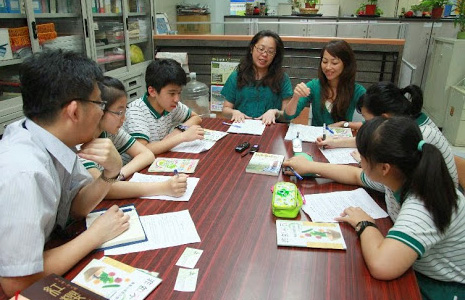 |
|
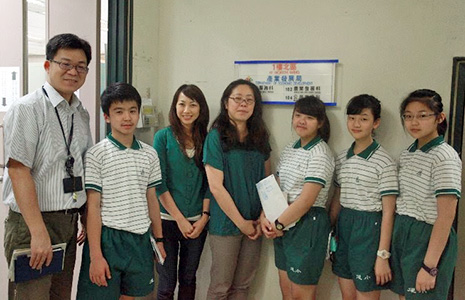 |
| |
|
|
Q4. The organic and toxic-free produces face the bottlenecks such as high labor cost, low yield and additional certification fees. Does Department of Economic Development take corresponding measures concerning these factors to assist the farmers? (Tsung-chun)
A4. Currently, we subsidize the farmers with the certification fees for organic product: 15,000 NTD for the first year and 9,000 NTD for the second year. There is also subsidy for fertilizer cost based on the land area. Besides subsidies, we host marketing and farming technology courses to the farmers, and even set up organic shops in Shilin and Beitou Districts in Taipei.
Q5. Does department manage the agricultural products regularly so as to make the consumers feel safe and assured? (Yin-cheng)
A5. Every year, we randomly inspect over 1,000 agricultural products from various supermarkets and organic shops. The inspections are conducted quarterly and involve two main channels: Consumer Ombudsman Officer and Department of Health. Some inspections are outsourced to National Farmers’ Association, R.O.C. to be conducted directly in the field. If pesticide residue is detected, the farmers should delay the harvest or directly destroy the crops.
Q6. Is the organic certification in Taiwan authentic? We heard that the vegetables and fruits with or without organic certification are from the same farm, just bearing different labels, is that true? (Tsai-chen)
A6. The organic certification in Taiwan is authentic. Even if they are from the same farm, they must be separate in planting. We make random inspection, and control the quantity of the labels. So the farmers cannot plant excessively and cannot sell them as well.
| |
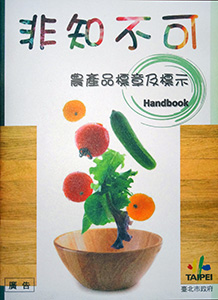 |
|
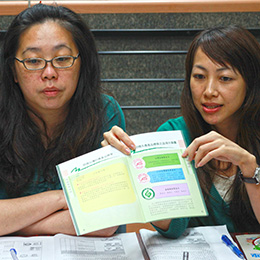 |
| |
|
|
|
Q7. There are many certifications for foods in Taiwan, such as TAP for Tracable Agricultural Products, CAS for Certified Agricultural Standard products, and CAS Organic for Certified Agricultural Standard Organic products. Why are there still food safety issues? How should we distinguish when buying the products? (Tsung-chun)
A7. There are many aspects to the food safety problems. TAP and CAS allow the use of pesticides, but within a threshold. CAS Organic is entirely organic, and does not allow the use of pesticides. Some people think that all three labels mean organic, but they are not. Our manual states the meaning of labels, the certification unity, and related laws. We remind the farmers not to abuse the term of “organic”. Relevant data also can be found on the website of the Council of Agriculture.
Q8. We know the “toxic-free inspection” of agricultural products in Taiwan is implemented by the Taiwan Agricultural Chemicals and Toxic Substances Research Institute of Council of Agriculture, Executive Yuan. After passing the inspection, a certification label will be issued. Does the department have special measures for the products with “toxic-free” labels issued in Taipei City? ( Wei-tse)
A8. At present, there is no “toxic-free” label, but only TAP, CAS, and CAS Organic. We do not have any relevant measures for the “toxic-free” label.
Q9. Under the subsidy of the “Self-Governance Ordinance for Industrial Development”, are there successful cases in the organic fruit industry? If any, what is this case? (Yin-cheng)
A9. At present, there is no subsidy for organic products under this ordinance, and no petition has been filed.
Q10. Some organic brands have high price, due to factors of labor, distribution, and marketing cost. In consideration of this, fans club of local farmers have been created online to purchase directly from the farmers. What is the attitude of the department toward such website? Is there any supportive production and sales channels for farmers? (Wei-tse)
A10. We also created the fans club in our website, helping the farmers to avoid being exploited by large companies. We also host farmers’ markets in Beitou, Shilin, Neihu, Nangang, and Wenshan districts, allowing the consumers to buy from the farmers directly.
Conclusion
The Department of Economic Development assists farmers to pursue higher quality of agricultural products by subsidizing certification fees on organic products, and hosting marketing and farming technology courses. To reduce the exploitation of the large companies, the department also hosts farmers’ market, allowing the consumers to buy directly from the farmers. However, it is difficult to grow organic fruits in Taiwan due to the high certification cost, time required, and risks involved. Only farmers with rich experiences could avoid losses and meet the standards of organic products. Therefore, it is quite difficult to obtain the label of CAS Organic. In addition, TAP and CAS are labels issued by the Taiwan Agricultural Chemicals and Toxic Substances Research Institute after rigorous inspection. Consumers can purchase the agricultural products with guaranteed food safety. We find that the Department of Economic Development has made efforts in developing organic agriculture in Taiwan, so as to create food safety for the public. |








